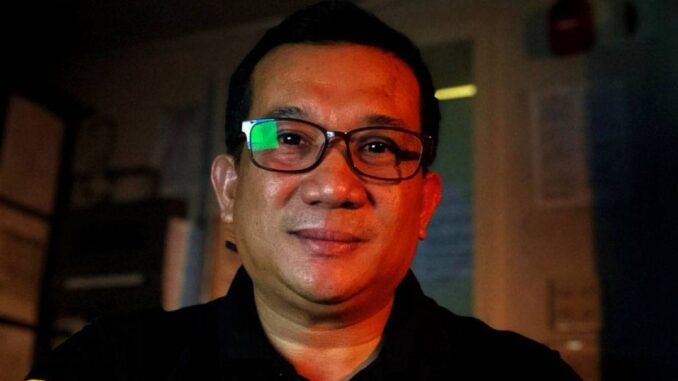
WHAT truly does make a ship safe?
Is it the mandatory safety procedures meticulously laid by international maritime organizations or the safety equipment with which ship owners must outfit their vessels? Will it be enough to pass the inspection of Port State Control (PSC) officials?
For seasoned ship captains like Bevis Emilio Casco, keeping a ship safe takes more than a village and goes beyond the sum of all these safety requirements.
Seasoned ship captain Bevis Emilio Casco says that keeping a ship safe takes more than a village and goes beyond the sum of all these safety requirements. CONTRIBUTED PHOTO
The 49-year-old Ilonggo’s decades of experience in the high seas understand that what binds these all together is the crew. For him, humans weigh heavier than policies and equipment.
“Policies only work when seafarers adhere to them. To make a ship safe, everyone must work in unison. There should be no shortcuts in implementing procedures,” Casco said.
The ship captain values teamwork and unity in his crew, regardless of whether they are of different nationalities, cultures or generations.
“I want us all to return home to our families — safe. To achieve this, there should be no incidents onboard. Everyone is briefed on company policies on safety even before they depart their country of origin and upon boarding the vessel. As the ship master, I ensure that all these are observed and that everyone complies,” he said.
Keeping up with the times
Leadership dynamics onboard vessels were different when Casco started sailing way back in the mid-90s.
A graduate of the prestigious Philippine Merchant Marine Academy (PMMA), Casco was educated and trained in a traditional quasi-military environment. He knew and respected the chain of command and the indisputable authority of a captain.
“Before, the captain was the king of the ship. No one questions his authority and decisions. Now, it’s different,” he shared.
Casco first felt the tides turning in the mid-2000s.
“The generation of seafarers by then was already different,” he said. Casco inferred that when he assumed command as ship captain in 2013, the younger crew were already more vocal and confident in expressing their thoughts.
He realized then that the ship could do well from having more heads thinking than one.
“I am not a very authoritative leader. I always ask for feedback from my crew, and I am open to complaints and constructive criticisms.
Listening to the inputs of the crew helps keep a ship safe,” Casco said.
The seasoned captain’s outlook on safety is honed to precision by Fleet Management Ltd., the world’s second-largest ship management company.
It was with the company where Casco earned his fourth stripe.
“I have achieved my goals because of Fleet Management. Their support, guidance, mentorship and encouragement helped me attain my promotion,” he said.
What it takes to be a seafarer
Casco shared counsel to the younger generation who wishes to become seafarers.
The ship officer shared that education, training and certifications qualify a person to become a seafarer, but it would not be enough.
“Seafaring is not for everyone. A person should be physically and mentally strong enough to weather all challenges at sea — the unpredictable and turbulent weather, the isolation, and the lengthy distance from family. This is on top of all the hard work, routines, inspections and paperwork.
“You should be dedicated to your job, dare to accept difficulties and possess tons of patience. It is a stressful job, but for those who persevere, it is very rewarding. The salary is competitive, you get to see the world and meet different nationalities, and every day is different,” he said.
Casco also shared that when the time comes for him to hang his hat, he might consider teaching in a maritime training center or a maritime school. What burns in his heart, though, is pursuing his dream of opening a restaurant in his hometown of Iloilo.
“Cooking is my hobby. Even at sea, I would help our chief cook. Some of my specialties are the staples of my province, Bachoy and Lomi,” Casco smiled.
Whenever he is on shore vacation, Casco helps his wife run their cafeteria in Iloilo and raise their two children.
“I would prefer to keep them from the difficulties of a sea-based job, but if my children would prefer it, I will support them,” Casco concluded.


Be the first to comment